What is Malware?
Malware (short for malicious software) refers to any software specifically designed to harm, exploit, or otherwise compromise computers, networks, servers, or devices. Malware can take many forms and is often used to steal sensitive data, disrupt operations, or gain unauthorized access to systems.
Common Types of Malware
- Viruses: Malicious code that attaches itself to clean files and spreads to other files, often corrupting or destroying data.
- Worms: Self-replicating malware that spreads across networks without user interaction.
- Trojans: Malware disguised as legitimate software, often used to create backdoors for attackers.
- Ransomware: Encrypts a victim’s data and demands payment (ransom) for the decryption key.
- Spyware: Secretly monitors and collects user activity, often for malicious purposes like stealing credentials.
- Adware: Displays unwanted advertisements and can sometimes include spyware.
- Rootkits: Grants attackers administrative control over a system while hiding their presence.
- Botnets: Networks of infected devices controlled by attackers to carry out large-scale attacks (e.g., DDoS).
- Cryptojacking: Malware that secretly uses a device’s resources to mine cryptocurrency.
Most Recent Examples of Malware (2022–2023)
1. LockBit 3.0 (Ransomware)
- Description: LockBit is one of the most active ransomware families, with its 3.0 version being highly sophisticated. It uses double extortion tactics, encrypting files and threatening to leak stolen data if the ransom isn’t paid.
- Recent Activity: In 2023, LockBit targeted numerous organizations worldwide, including healthcare, education, and government sectors.
- Impact: Caused significant financial losses and operational disruptions.
2. Cl0p (Ransomware)
- Description: Cl0p is a ransomware-as-a-service (RaaS) group known for exploiting vulnerabilities in software to infiltrate networks.
- Recent Activity: In 2023, Cl0p exploited a zero-day vulnerability in the MOVEit file transfer software to steal data from hundreds of organizations, including Shell, British Airways, and the US Department of Energy.
- Impact: Massive data breaches and reputational damage for affected organizations.
3. Black Basta (Ransomware)
- Description: A relatively new ransomware group that emerged in 2022, Black Basta is known for its fast encryption and double extortion tactics.
- Recent Activity: Targeted critical infrastructure, healthcare, and manufacturing sectors in 2023.
- Impact: Disrupted operations and caused financial losses.
4. Emotet (Trojan)
- Description: Emotet is a modular Trojan that primarily spreads through phishing emails. It is often used to deliver other malware, such as ransomware.
- Recent Activity: After a brief hiatus, Emotet re-emerged in 2023 with new evasion techniques and improved capabilities.
- Impact: Continues to be a significant threat to organizations worldwide.
5. Raspberry Robin (Worm)
- Description: A worm that spreads via USB drives and is often used as a precursor to more damaging attacks, such as ransomware deployment.
- Recent Activity: In 2023, Raspberry Robin was linked to attacks on telecommunications and technology companies.
- Impact: Serves as an initial access vector for more sophisticated attacks.
6. Royal Ransomware
- Description: A human-operated ransomware group that targets enterprises and demands high ransom payments.
- Recent Activity: In 2023, Royal ransomware targeted healthcare, education, and manufacturing sectors.
- Impact: Caused significant financial and operational disruptions.
7. Fake ChatGPT Malware
- Description: Cybercriminals have exploited the popularity of ChatGPT to distribute malware. Fake ChatGPT apps and browser extensions have been used to steal data or install malicious software.
- Recent Activity: In 2023, fake ChatGPT apps were found on unofficial app stores and websites.
- Impact: Compromised user data and devices.
8. DarkGate (Loader Malware)
- Description: A malware loader that delivers additional payloads, such as ransomware or spyware.
- Recent Activity: In 2023, DarkGate was distributed via phishing campaigns and exploited vulnerabilities in software.
- Impact: Enabled further attacks on compromised systems.
How Malware Spreads
- Phishing Emails: Malicious attachments or links in emails.
- Malicious Websites: Drive-by downloads or fake software updates.
- USB Drives: Infected devices spread malware when connected to a system.
- Software Vulnerabilities: Exploiting unpatched software to gain access.
- Social Engineering: Tricking users into downloading or executing malware.
How to Protect Against Malware
- Keep Software Updated: Regularly update operating systems, applications, and antivirus software.
- Use Strong Passwords: Implement multi-factor authentication (MFA) wherever possible.
- Educate Users: Train employees and users to recognize phishing attempts and suspicious links.
- Backup Data: Regularly back up critical data and store it offline or in a secure cloud environment.
- Install Antivirus/Anti-Malware: Use reputable security software to detect and block malware.
- Enable Firewalls: Use firewalls to block unauthorized access to networks.
- Monitor Networks: Implement intrusion detection and prevention systems (IDPS) to identify and stop attacks.
Conclusion
Malware remains a significant threat to individuals, businesses, and governments worldwide. Recent examples like LockBit 3.0, Cl0p, and Black Basta highlight the evolving sophistication of cyberattacks. Staying informed about the latest threats and implementing robust security measures is essential to protect against malware and its potentially devastating consequences.

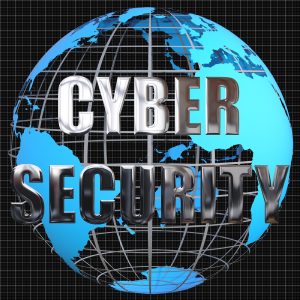 Cybersecurity is the practice of protecting internet-connected systems, including hardware, software, and data, from digital attacks. The term encompasses a vast range of practices, tools, and technologies that aim to safeguard the integrity, confidentiality, and availability of digital assets. Cybersecurity is important because the world is increasingly reliant on digital systems. From financial transactions to healthcare records, a significant portion of our lives is now stored and managed online. This reliance introduces a range of potential risks, including data breaches, identity theft, and system failures, which cybersecurity practices aim to mitigate. Cybersecurity can be divided into several sub-categories, including network security, application security, information security, operational security, and disaster recovery and business continuity. Each of these areas requires a unique set of strategies, tools, and best practices to ensure comprehensive cybersecurity. There are numerous cybersecurity certifications available that can help professionals demonstrate their knowledge, skills, and expertise in the field. Some of the most popular and widely recognized certifications include:
Cybersecurity is the practice of protecting internet-connected systems, including hardware, software, and data, from digital attacks. The term encompasses a vast range of practices, tools, and technologies that aim to safeguard the integrity, confidentiality, and availability of digital assets. Cybersecurity is important because the world is increasingly reliant on digital systems. From financial transactions to healthcare records, a significant portion of our lives is now stored and managed online. This reliance introduces a range of potential risks, including data breaches, identity theft, and system failures, which cybersecurity practices aim to mitigate. Cybersecurity can be divided into several sub-categories, including network security, application security, information security, operational security, and disaster recovery and business continuity. Each of these areas requires a unique set of strategies, tools, and best practices to ensure comprehensive cybersecurity. There are numerous cybersecurity certifications available that can help professionals demonstrate their knowledge, skills, and expertise in the field. Some of the most popular and widely recognized certifications include: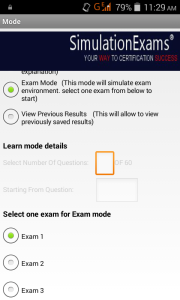
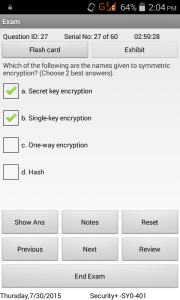
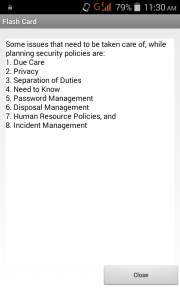
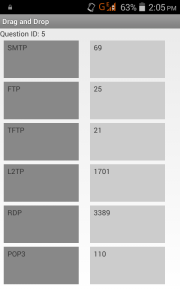
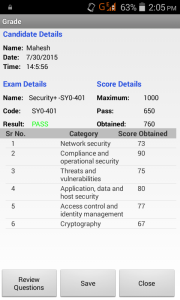
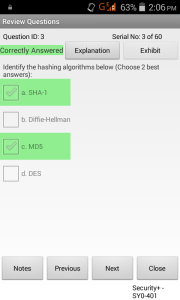

 Simulationexams.com, leading practice tests provider, updated it’s
Simulationexams.com, leading practice tests provider, updated it’s 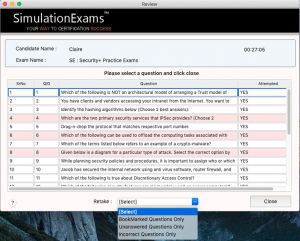 The exam engine offers a rich feature set that include
The exam engine offers a rich feature set that include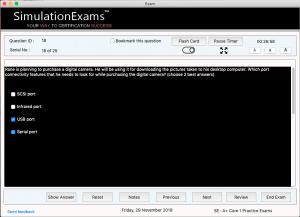 As you can see in the figure below, exam screen is where the user is presented with a question to answer. Each question will have question ID (this is unique for every exam), flash card explanation, timer (you can pause it in Learn Mode), and night mode. You can also take the exam in full screen for better concentration while taking the exam.
As you can see in the figure below, exam screen is where the user is presented with a question to answer. Each question will have question ID (this is unique for every exam), flash card explanation, timer (you can pause it in Learn Mode), and night mode. You can also take the exam in full screen for better concentration while taking the exam.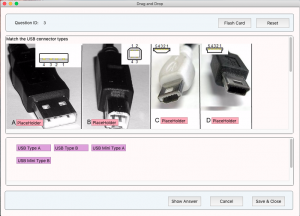 This type of question challenges the user to match the image with respective description. For example, identifying various types of connectors available on computer motherboard.
This type of question challenges the user to match the image with respective description. For example, identifying various types of connectors available on computer motherboard.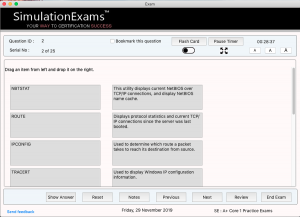 This type of question is similar to image drag n drop, but uses text to match. A sample question is shown in the figure. The user needs to drag the left side box on to the correct box on the right side.
This type of question is similar to image drag n drop, but uses text to match. A sample question is shown in the figure. The user needs to drag the left side box on to the correct box on the right side.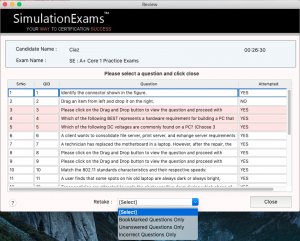 The review screen provides an overview of all the questions that have been answered or not. Candidates can directly go to the un-answered questin and answer it using Review Screen. Note that if the time is over for the exam, the exam is terminated and the results are saved.
The review screen provides an overview of all the questions that have been answered or not. Candidates can directly go to the un-answered questin and answer it using Review Screen. Note that if the time is over for the exam, the exam is terminated and the results are saved.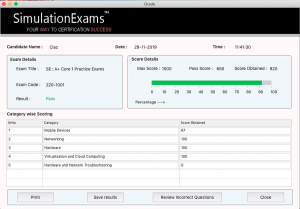 After completing the exam or after the time is over for completion of the exam, the score card is displayed. The category wise scoring is reported in the exam score sheet.
After completing the exam or after the time is over for completion of the exam, the score card is displayed. The category wise scoring is reported in the exam score sheet.